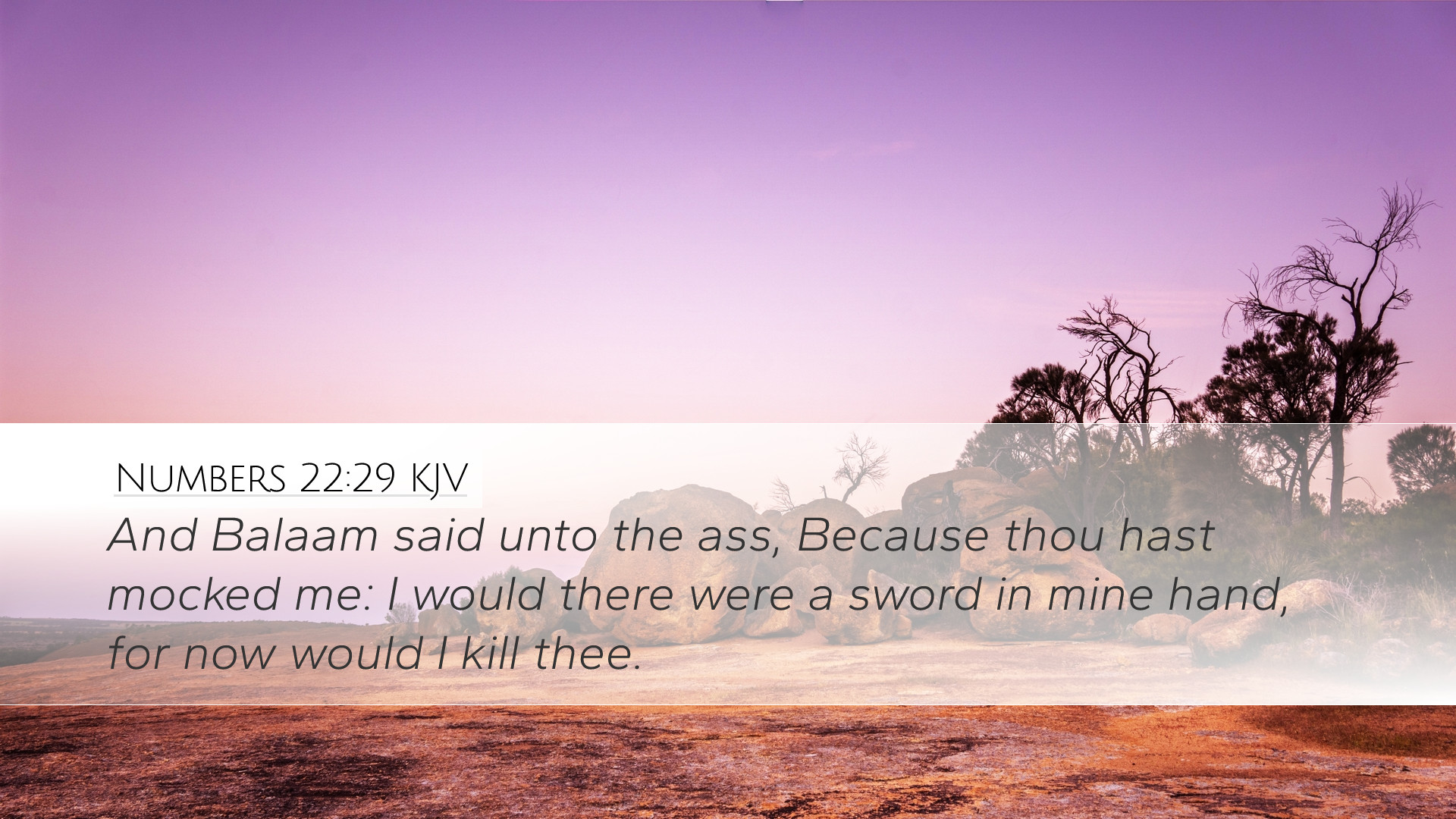Commentary on Numbers 22:29
Numbers 22:29 states, “And Balaam said unto the ass, Because thou hast mocked me: I would there were a sword in mine hand, for now would I kill thee.” This verse presents a moment of intense emotion and reveals various theological and moral insights from the narrative of Balaam and his interactions with the donkey and the Lord.
Contextual Background
Before delving into the specifics of this verse, it is essential to understand the broader context of Numbers 22. This chapter recounts the story of Balaam, a prophet, summoned by Balak, the Moabite king, to curse Israel. The narrative highlights themes of divine sovereignty, human agency, and the tension between God's will and human desire.
The Characters Involved
- Balaam: A figure often depicted as a prophet with a complicated relationship with God. His intentions and motivations spark various interpretations.
- The Donkey: Represents a vessel of divine communication, showcasing how God can use the most unlikely sources to convey profound truths.
- God: The supreme authority orchestrating events to achieve His purposes, demonstrating both His patience and sovereignty.
Analysis of Balaam's Reaction
Balaam’s reaction to the donkey is striking. His statement reflects a blend of frustration and a violent impulse. This response diverges from the expectations one might have of a prophet, raising questions about Balaam's character and his understanding of authority.
Matthew Henry notes this as an instance where Balaam's anger blinds him to the miraculous nature of God's intervention. Rather than acknowledging the donkey's unusual behavior as a sign from God, he feels mocked, revealing his pride and spiritual blindness.
Theological Implications
The incident illustrates several crucial theological themes:
- Divine Sovereignty: God’s control over all events, including the actions of Balaam and the donkey. Adam Clarke emphasizes that the donkey, through divine enablement, sees what Balaam cannot—a testament to God’s omniscience.
- Human Agency and Accountability: Balaam’s response shows how humans can choose to act irrationally despite divine clarity. He overlooks the moral high ground and resorts to threats of violence, revealing a heart hardened by greed and ambition.
- Unexpected Communication: The donkey serves as an agent of revelation. This emphasizes that God can communicate through any means, challenging the expectation of how and through whom divine messages come, reflective of Albert Barnes' insights on divine communication.
Lessons for Believers
This verse and its preceding context offer several lessons relevant to believers today:
- Openness to Divine Signals: Balaam’s inability to heed the strange behavior of his donkey serves as a reminder to remain sensitive to God's signs, even those that come in unexpected forms.
- Examination of Motives: The confrontation between Balaam and the donkey reveals the need for self-reflection. Pastors and theologians must consider their motivations—are the pursuits of our hearts aligning with God’s will?
- The Reality of Anger: Balaam’s readiness to kill reflects sinful anger that can arise from pride and misunderstanding. This serves as a caution against allowing frustration to govern responses, a timeless lesson for all in ministry.
Conclusion
In conclusion, Numbers 22:29 provides a rich text filled with spiritual insights. The interaction between Balaam and the donkey highlights the grave importance of being attuned to God’s communication, recognizing our own failings, and allowing the Holy Spirit to guide our responses. As we study this passage, may we cultivate hearts that are quick to listen, slow to speak, and slow to become angry, adhering closely to the divine instructions laid before us.


